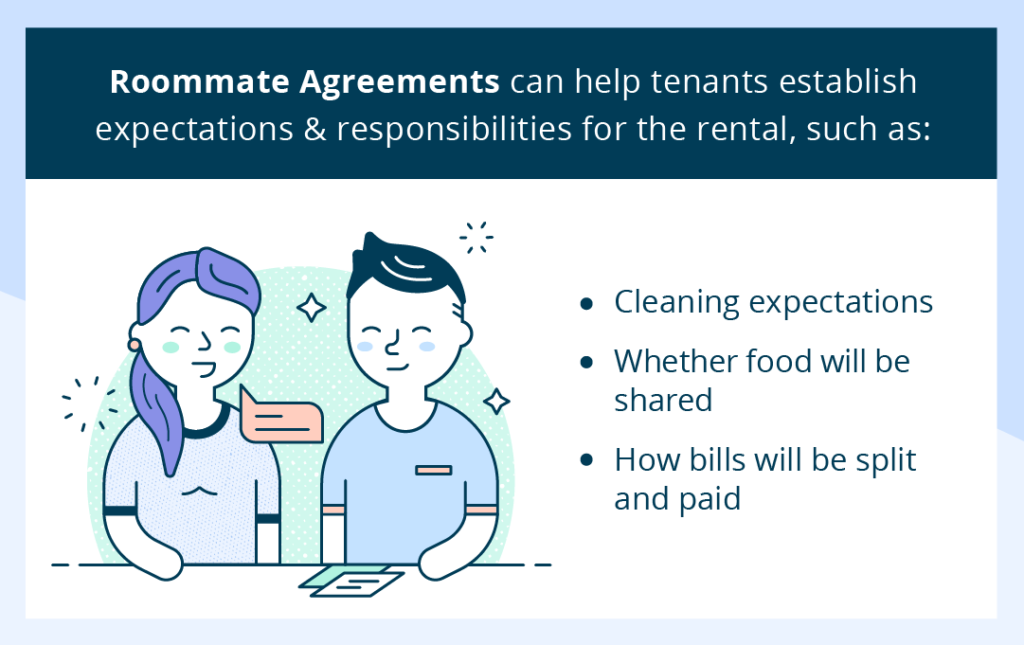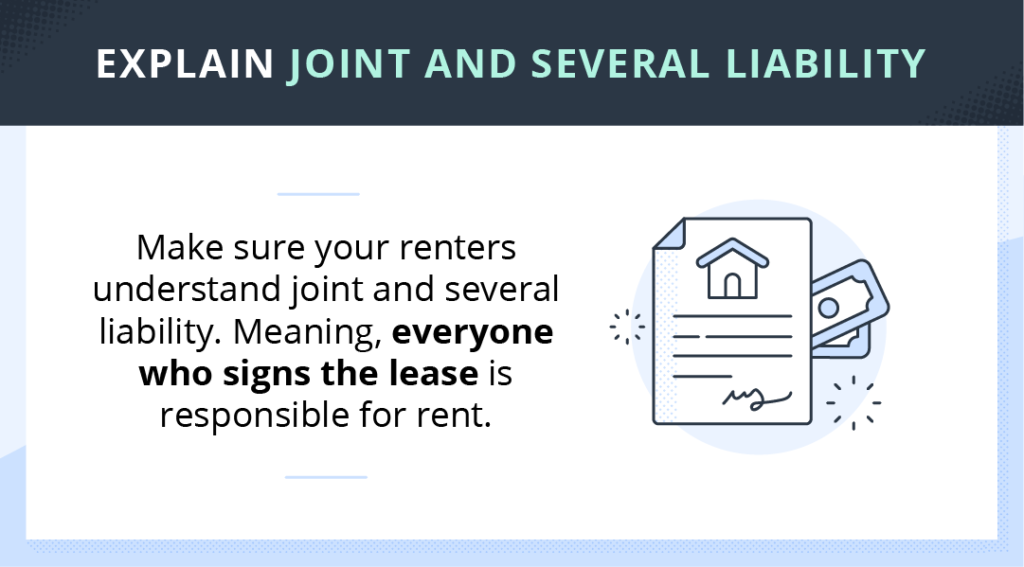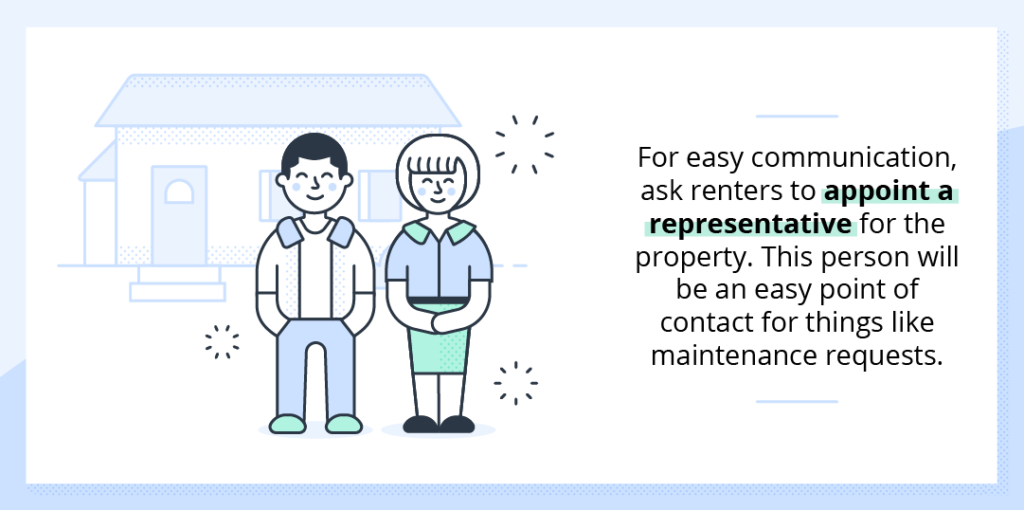

While many landlords are accustomed to leasing their rental property to a single family or an individual, you may need to rent your property to multiple tenants under one lease.
Renting with roommates has become increasingly prevalent, especially in college towns and areas where the cost of living is high. To make the most of this arrangement, there are a few tips you should follow.
The best strategy is to be prepared. This article will set you and your tenants up for sucess.
Streamline Your Rental Property ManagementMarketing. Applications. Leases. Payments.
Streamline Your Rental Property ManagementMarketing. Applications. Leases. Payments.

A roommate agreement is a document signed by each tenant that provides a detailed explanation of expectations, rules, and responsibilities for living in the shared unit. The agreement can address many issues before they become a problem, for example:
A landlord typically has no involvement in roommate agreements, but that doesn’t mean you can’t encourage one.
Though roommate agreements are between the tenants and aren’t legally binding, a judge can enforce financial agreements, such as rent being divided fairly among tenants and paid in a timely manner. Remind all tenants the agreement is for their personal use and that you don’t resolve disputes. If tenants come to you with their roommate issues, you should remind them that you can’t step in on interpersonal problems and will not take sides.
Before the lease is signed, it’s a good idea to let all tenants know the actions of one person can have potentially negative consequences for everyone living in the rental unit. Make sure they understand even if just one person violates all or part of the lease, you can terminate everyone’s tenancy as a result. Before you are faced with a group of upset and angry roommates insisting they “didn’t do it,” advise them they must feel comfortable living with each other since all co-tenants are responsible for the negative actions of each person.
Unexpected things happen during a lease agreement that may result in one or more of the tenants wanting to move out. It could be that one of them decides they want to move in with their significant other, gets married, or simply doesn’t enjoy the roommate situation. There are a variety of reasons why tenants will want to sublease their apartment, but it can turn into a tricky situation that could be consequential for the landlord.
Because sublessors don’t actually sign the lease, which means they are not jointly and severally liable for rent or other obligations stated in the rental agreement. The sublessor will go through the original renter who signed the lease agreement. They will then pay rent to you – and it can get complicated quickly, especially if one of them neglects to pay rent.
While the decision to allow subleasing might be necessary for specific instances, it’s up to you as a landlord to decide what you want to do. Protect your own interests by making sure each tenant is responsible for meeting the terms of the lease, which is ywhy disallowing subleasing will make things easier in the long run.

The basics of joint and several liability are that everyone who signs the lease is responsible for rent. If one tenant can’t pay, that doesn’t mean the other two can only pay their portion and call it good. If they signed the lease, all tenants have to make sure the full amount of rent is paid every month.
Having this on the lease and explaining it to tenants is essential when it comes to multiple-tenant leases – regardless of how they choose to divide it up.
Before the original rental agreement is signed, let all tenants know security deposits will not be divided. Remind them that when the security deposit is returned, it will be via one check only. You could also spell this out specifically in the lease to mitigate confusion.
Renting to roommates means there will probably be some unique situations when it comes to renewing leases. For example, if a lease is 12 months, and at the end of that year’s time, one roommate may choose to leave, and the other two may choose to renew the lease. Let them know the security deposit will only be returned when the rental unit is completely vacated and all damage is assessed. It’s up to the roommates to work out any issues regarding security deposits that may arise if one tenant decides to leave.
Another thing to keep in mind is the amount of the security deposit a landlord will return at the end of a tenancy. Joint and several liability still applies to damages that occur. Suppose at the beginning of the lease, four tenants paid a security deposit of $500, each one contributing $125. When the apartment is vacated and the damage is assessed, you discover that there is $200 worth of damage, and you can only return $300. Make sure the tenants know it will be returned in one check, so they’ll have to decide how to divide it. Here is a sample letter for damages you will need to send to tenants.

By asking the tenants to appoint one person as a representative, you can ensure you will always have a consistent contact for all forms of communication. Rather than having to contact each tenant individually, this will be the person you speak to about issues or concerns that arise, such as submitted maintenance requests.
But make sure all the roommates understand that being the representative does not make this person solely responsible for any incidents that may happen. Rather, they are the point of contact for everyone living on the property. If you need to get in contact with the tenants, this is the person you can get to know and expect to communicate with if the rent is late.
When one or more roommates decide to move out of the property at the end of the original lease, it is common for the remaining tenants to find one or more replacements they would like to add to the renewal. Remember to screen the replacements in the same way you did the original tenants. It happens often in the leasing industry that when the original roommates were excellent tenants, a landlord will add a replacement tenant to the lease without question. Don’t make any exceptions regarding income and credit requirements, background checks, or other screening requirements – it’s essential to protect your property by making sure there are no red flags in the screening report.
Encouraging or requiring renters insurance is an easy way for roommates to stay protected if any of their belongings are stolen or damaged by covered incidents. There are many benefits of renters insurance, and renters never know what might happen, who might leave the door unlocked, or if any accidents will occur.
Having leases with multiple tenants can be straightforward as long as you follow the suggestions above and maintain frequent communication with your renters. If you are in need of a state-specific lease agreement, check out our online and customizable lease agreements that were made with local landlords and lawyers.
While it is ultimately up to you as a landlord, subleasing can lead to various issues. It can complicate things since sublessors don’t sign the lease and will have to go through the original tenant on the lease.
No. While you should encourage roommate agreements, it is not your responsibility to be in charge of them or settle disputes between tenants. Roommate agreements will hopefully help mitigate the problems that roommates may face with each other.
Yes. As a lease with multiple tenants makes them jointly and severally liable, you should only collect rent one way and one time when it is due. The tenants themselves will have to decide how to split the rent and who is in charge of actually paying the landlord.